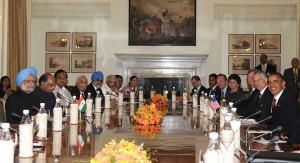The global dimensions seek to provide an enhanced role for India as a global power. Obama emphsasised on more than one occasion that India can no longer be charactertised as an emerging power as the Bush Administration used to do, but is already a global power
The global dimensions seek to provide an enhanced role for India as a global power. Obama emphsasised on more than one occasion that India can no longer be charactertised as an emerging power as the Bush Administration used to do, but is already a global power. India’s enhanced role as a global power will be assured through the following actions with the support of the US:
- India’s eventual permanent membership of the UN Security Council as part of the reforms in the UN structure. This amounts to the US agreeing in principle to India’s permanent membership, but no time-line has been indicated. There is also a lack of clarity on the issue as to whether the US wants India to be a permant member with full veto rights on par with China and the other four permanent members.
- ”The United States intends to support India’s full membership in the four multilateral export control regimes (Nuclear Suppliers Group, Missile Technology Control Regime, Australia Group, and Wassenaar Arrangement) in a phased manner, and to consult with regime members to encourage the evolution of regime membership criteria, consistent with maintaining the core principles of these regimes, as the Government of India takes steps towards the full adoption of the regimes’ export control requirements to reflect its prospective membership, with both processes moving forward together. In the view of the United States, India should qualify for membership in the Australia Group and the Wassenaar Arrangement according to existing requirements once it imposes export controls over all items on these regimes’ control lists.”
- “They agreed to work together in the G-20 to make progress on the broad range of issues on its agenda, including by encouraging actions consistent with achieving strong, balanced, and sustainable growth, strengthening financial system regulation, reforming the international financial institutions, enhancing energy security, resisting protectionism in all its forms, reducing barriers to trade and investment, and implementing the development action plans.”
while the regional and bilateral dimensions, which depend only on the two countries, can be concretised in the short and medium terms, the global dimensions will face likely hurdles from China before their concretisation.
- “The leaders launched a US-India Open Government Dialogue that will, through public-private partnerships and use of new technologies and innovations, promote their shared goal of democratizing access to information and energizing civic engagement, support global initiatives in this area and share their expertise with other interested countries. This will build on India’s impressive achievements in this area in recent years and the commitments that the President made to advance an open government agenda at the United Nations General Assembly. The President and Prime Minister also pledged to explore cooperation in support of efforts to strengthen elections organization and management in other interested countries, including through sharing their expertise in this area. Taking advantage of the global nature of their relationship, and recognizing India’s vast development experience and historical research strengths, the two leaders pledged to work together, in addition to their independent programmes, to adapt shared innovations and technologies and use their expertise in capacity building to extend food security to interested countries, including in Africa, in consultation with host governments.”
The concretisation of the first two actions relating to the UN Security Council and multilateral export control regimes is likely to take time because of the possibility of Chinese opposition, partly for their own reasons and partly at the instigation of Pakistan.The idea of joint Indo-US projects in Africa will also cause concern in China which has been very active in Africa.
 The Joint Statement sums up the bilateral dimension as follows: “Recognizing that India and the United States should play a leadership role in promoting global nonproliferation objectives and their desire to expand high technology cooperation and trade, Prime Minister Singh and President Obama committed to work together to strengthen the global export control framework and further transform bilateral export control regulations and policies to realize the full potential of the strategic partnership between the two countries.
The Joint Statement sums up the bilateral dimension as follows: “Recognizing that India and the United States should play a leadership role in promoting global nonproliferation objectives and their desire to expand high technology cooperation and trade, Prime Minister Singh and President Obama committed to work together to strengthen the global export control framework and further transform bilateral export control regulations and policies to realize the full potential of the strategic partnership between the two countries.
Accordingly, the two leaders decided to take mutual steps to expand U.S.-India cooperation in civil space, defense, and other high-technology sectors. Commensurate with India’s nonproliferation record and commitment to abide by multilateral export control standards, these steps include the United States removing Indian entities from the U.S. Department of Commerce’s “Entity List” and realignment of India in U.S. export control regulations.” There is also a counter-terrorism dimension to the joint partnership. This will be covered in the next article.
My over-all expectation is that while the regional and bilateral dimensions, which depend only on the two countries, can be concretised in the short and medium terms, the global dimensions will face likely hurdles from China before their concretisation. — Continued… Obama’s Visit: Focus on Pakistan
All photo courtesy: Press Bureau of India




